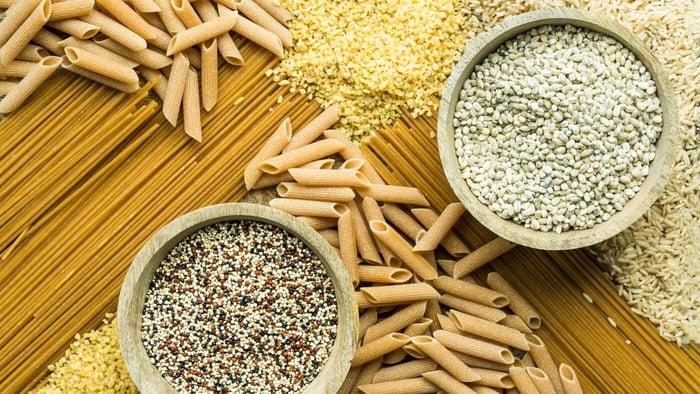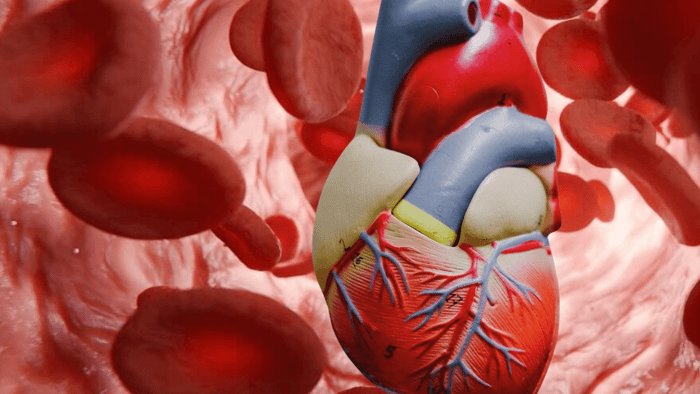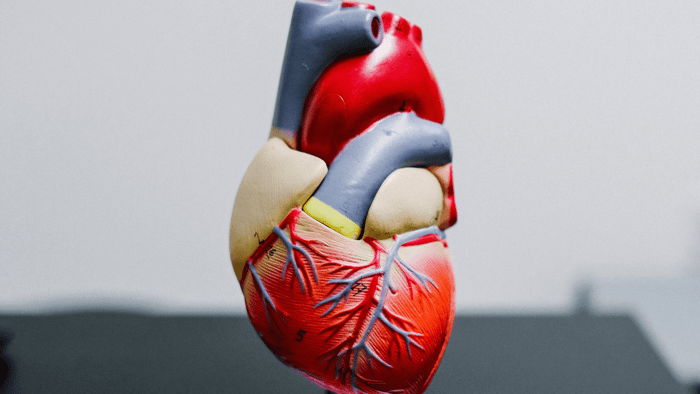Table of Contents
High LDL cholesterol contributes to heart disease, so it makes sense to learn how to lower cholesterol levels. There are short-term fixes, such as avoiding alcohol and tobacco, and long-term fixes, such as regular exercise and dietary changes.
Though we’ve seen lots of evidence that cholesterol isn’t the primary culprit for heart problems, it is still a factor. Therefore, we believe it’s important to lay out the six best ways that you can naturally lower cholesterol without relying on man-made pharmaceuticals with nasty side effects.
1. Make Specific Dietary Changes
A healthy eating plan is incredibly important. Making targeted dietary changes can greatly impact your cholesterol and heart health. A low-fat diet is not a good option for most; instead, aim for a healthy diet full of good fats while avoiding trans fats.
Does fat impact cholesterol? Yes, certain fats impact your cholesterol levels. Here are the types of fat and how they affect you:
Trans fat — Avoid trans fat, which is commonly found in fried foods and heavily processed products. Trans fat can increase cholesterol levels and blood pressure, particularly trans fats of industrial origin. (It’s difficult to tell if trans fats are natural or industrially made.) (1)
Saturated fat — Many experts over the decades have disparaged saturated fat, which is found in red meat, full-fat dairy, and tropical oils like palm oil. However, modern research shows that, although saturated fat may increase cholesterol, it does not contribute to heart disease, which is the main reason you’d ever avoid saturated fats. (2)
Monounsaturated fat — This healthy fat is found in certain oils, such as olive oil, nuts, seeds, and avocados. It is a key part of the Mediterranean diet and helps keep your cholesterol at a healthy level. (3)
Polyunsaturated fat — This healthy unsaturated fat is found in certain oils, like omega-3 fatty acids, nuts, flaxseeds, fish, natto, and much more. It can prevent LDL cholesterol from getting too high. (4)
Does soluble fiber help cholesterol? Yes, soluble fiber may reduce absorption of unhealthy cholesterol into your bloodstream. (5) It may also reduce healthy HDL cholesterol, though.
It may sound cliche, but you need to eat healthy fats and avoid unhealthy fats:
Eat this — Fish, dairy products, oil, lentils, nuts, seeds, whole grains (e.g. brown rice), fermented foods (like natto), and organic grass-fed red meat can help keep your cholesterol levels healthy.
Avoid this — You should eliminate anything from your diet that is fried or heavily processed, such as most shelf-stable products, frozen meals, and high-sodium foods. (Stick to the outer walls of the grocery store – most everything in the aisles is processed.)
2. Implement Regular Exercise
Just exercise, and you’ll be healthier! But really, any physical activity has been shown to reduce bad cholesterol while improving cardiovascular health. (6) The more intense the exercise, it seems, the better your cholesterol levels get.
Cardio exercise is great for cholesterol — plus it’s heart-healthy. Strength training and flexibility exercises may also contribute to healthy cholesterol levels. We recommend a brisk walk every day for 30 minutes. Jogging, swimming, cycling, and yoga are also beneficial.
3. Maintain a Healthy Weight
Obesity is a major risk factor for high cholesterol buildup and heart problems. Sometimes, high LDL cholesterol contributes to a high body weight. Sometimes, a high body weight contributes to unhealthy cholesterol levels — it’s a vicious cycle! (7)
Moderate your food intake, increase your physical activity, and talk to your doctor about other ways to lose weight in your unique circumstances. Maintaining a healthy weight may decrease unhealthy cholesterol and lower your risk for heart disease.
4. Limit Alcohol
Alcohol is not only a neurotoxin, but high alcohol consumption also increases your risk of high cholesterol and cardiovascular disease. (8)
Light red wine intake may favorably impact your cholesterol levels, but anything more than 1-2 drinks a day will likely increase your cholesterol. Interestingly, studies show increases in both good (HDL) and bad (LDL) cholesterol, but you can still have too much HDL cholesterol. (9)
5. Quit Smoking
Tobacco and tobacco-less smoking can lead to a whole host of issues, including high cholesterol. Since we’re talking like friends here, don’t smoke — it hurts your heart, mouth, and brain, not to mention ups your risk for cancer.
Smokers have higher total cholesterol levels than non-smokers. (10) However, current smokers also have lower levels of healthy HDL cholesterol than current non-smokers. Smoking seems to have more of an effect on lowering HDL than it does on raising unhealthy LDL levels.
6. Opt for Statin Alternatives
Statin medications are okay at reducing LDL cholesterol levels, but they do less to prevent heart disease. Plus, they often come with side effects that drastically impact your quality of life. So, what are some effective statin alternatives?
Medications like ezetimibe, PCSK9 inhibitors, or fibrates may address cholesterol through different methods from statins. However, they still cause side effects in many individuals.
Lifestyle changes, such as diet changes and increased exercise, are important ways to maintain healthy cholesterol levels, and these don’t come with the nasty side effects that statins have.
Dietary supplements may help with cholesterol levels, including: (11, 12, 13, 14, 15)
Nattokinase (which is present in our very own Toku Flow)
The Truth Regarding Cholesterol
Cholesterol is not a helpful term because it can refer to multiple things:
Low-density lipoprotein (LDL) cholesterol, in certain cases, may be atherosclerotic and can increase the risk of heart disease. However, this type of cholesterol has been exaggerated in terms of cardiovascular risk. Healthcare researchers have overestimated LDL cholesterol’s impact on the heart — although there is some impact.
High-density lipoprotein (HDL) cholesterol is generally healthy except at very high levels. More HDL is usually considered a good thing, as it helps eliminate LDL.
Dietary cholesterol is the cholesterol you consume in foods, not what’s created in your liver. Even as scientists claimed LDL cholesterol was a leading indicator of heart disease, dietary cholesterol was known to have no significant correlation with heart problems.
Cholesterol markers are not really that important in predicting heart disease — not as helpful as biomarkers like ApoB or Lp(a). Also, small LDL particle levels (not total LDL levels, which include large LDL particles) are a frequently-overlooked biomarker that may better inform cardiovascular risk.
Nearly 75% of patients hospitalized for a heart attack had cholesterol levels that indicated they were not at high risk for a cardiovascular event. Yes, in specific cases, it may be beneficial to focus on lowering LDL cholesterol; it’s clearly not the only aspect to focus on, though. There are a lot of other ways to help your heart.
Learn More: The New Truth About Cholesterol
The Takeaway
For most, cholesterol levels take a few weeks to noticeably go down. For a few, it may take 3-6 months. More significant changes to diet, exercise, and supplements may reduce that timeline.
A mix of lifestyle adjustments and dietary changes can often improve your cholesterol levels while lowering your risk for heart disease and avoiding those pesky side effects. Some supplements like nattokinase and berberine are great for cholesterol and heart health.
Try Toku Flow, a nattokinase supplement that promotes proper cholesterol levels and supports overall heart health.Read Next: LDL Particle Size: What It Is and Why It Matters
Sources
The effect of trans fatty acids on human health: regulation and consumption patterns.
A short history of saturated fat: the making and unmaking of a scientific consensus.
Monounsaturated fat vs saturated fat: Effects on cardio-metabolic health and obesity.
Polyunsaturated fatty acids for the primary and secondary prevention of cardiovascular disease.
The effect of alcohol on cardiovascular risk factors: is there new information?
Meta-analysis of the effects of smoking and smoking cessation on triglyceride levels.
Plant sterols and plant stanols in cholesterol management and cardiovascular prevention.




